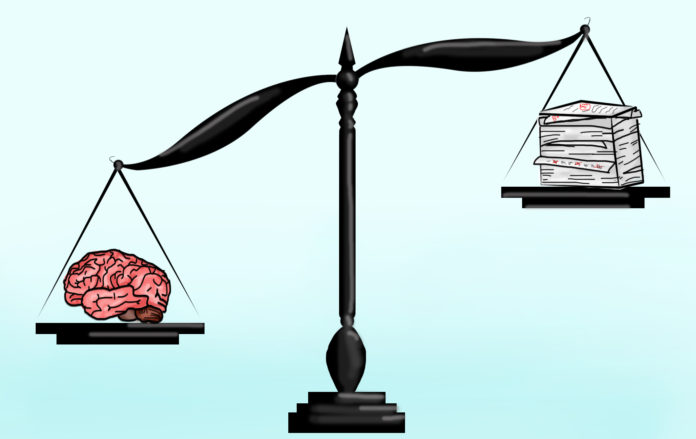Education has become quantified instead of qualified, and this is wrong. We should find value in education based on what we learn, not by numbers like a grade or GPA.
Although GPA is important for those applying to grad school or professional schools, the focus of education as a whole can still be shifted. There are definitely better ways to determine if someone is ready for grad school or professional schools, such as essays and recommendations from internships and professors. Acceptance should be based on preparedness to take the next step in career maturity, not the ability to memorize one thousand flashcards that will only be forgotten as the student walks out of the classroom.
As midterm season passes and students start to realize the reality of their grades, panic settles in. Stress over scholarships and grade point averages takes over and students let their test scores take over their lives. Jealousy sets in when talking to friends who scored higher or studied a bit more, and worry sets in when talking to a professor and realizing that the next test requires a 99 percent in order to get an A in the class. This is heightened during midterms and finals, but the stress of school is prevalent year round, with every exam or project.
There’s often a big emphasis put on the quantitative aspects of education, but when we graduate, we’re not separated by GPA, but by the quality of what we learned. While still in school, your professors look at the numbers and the scores. However, going for a job interview, human resources representatives tend to ask about skills and lessons you learned that will carry over to success in the job, not GPA. Graduating as valedictorian doesn’t necessarily translate to being the most professional and the most qualified for a career.
However, if the focus of education becomes a bit more fine-tuned, students will be able to target their energies on actually learning the material, rather than just trying to get the highest score possible on a test and then forget the information as they begin studying for another.
A recent report from two Yale Professors came out showing that students care so much about the score they receive that professors curve the grades so students will be happier. Students are putting so much faith in the grading curve that they don’t actually perform “A” quality material, because the curve fixes all. According to the article, “the curve can reduce the incentive to study and result in grade inflation.” This grade inflation teaches students that they actually don’t need to work hard and study as hard, because they’ll magically get what they want in the end. This mentality is not healthy to instill because it doesn’t carry to the adult world; work assignments aren’t curved, so grades shouldn’t be either.
The issues with the grading curve bring the debate back to the start; making grades the sole marks of academic success isn’t the best philosophy. By putting so much value on the numerical outcome, students are taught to want the grades rather than the knowledge, and it results in excessive amounts of stress. Stress leads to sicknesses like the flu, making students vulnerable to an unhealthy semester. If less emphasis was placed on grades and more emphasis was placed on enjoying the process and learning as much as possible, without the quantification, then students might be less likely to get sick from stress and more inclined to work hard.
As a whole, the focus of education should be how much a student learns and how the student will be able to apply that knowledge, not the numbers that bog students down more often than motivating them.






